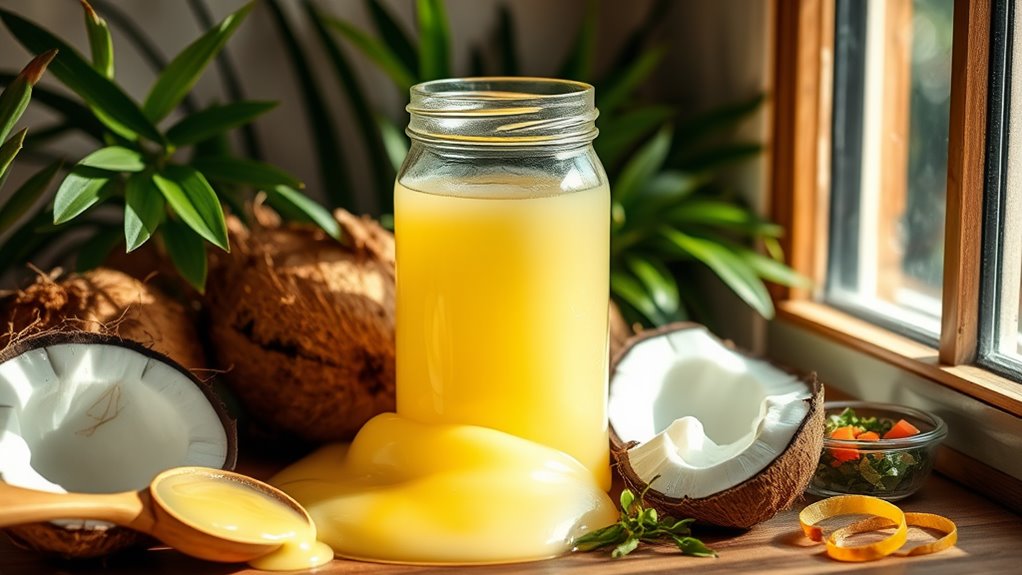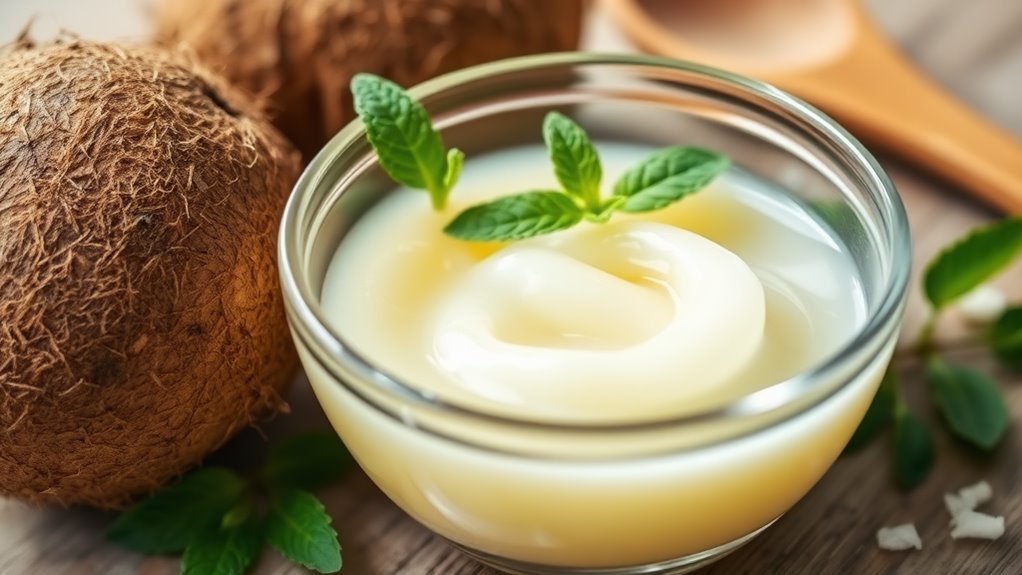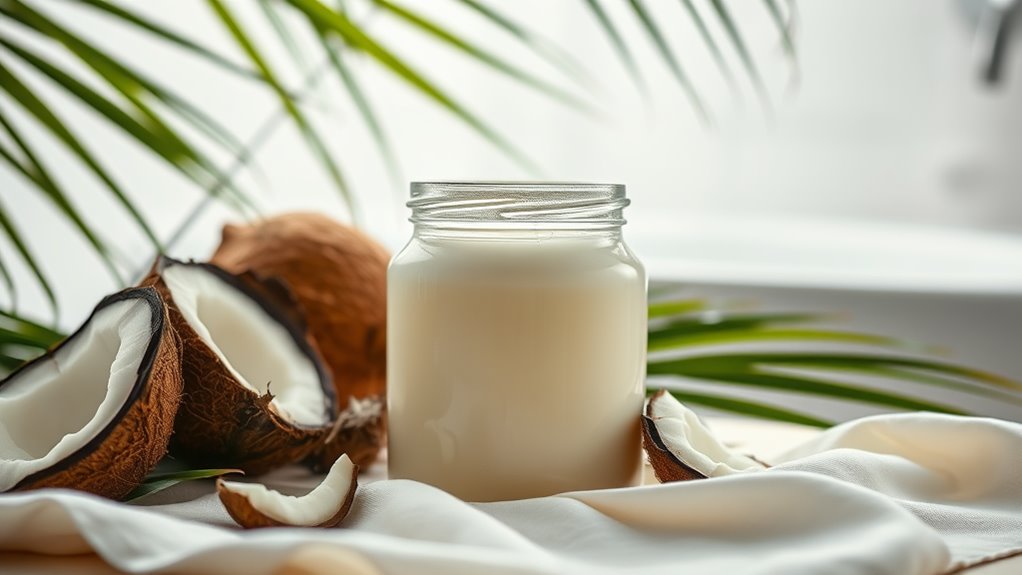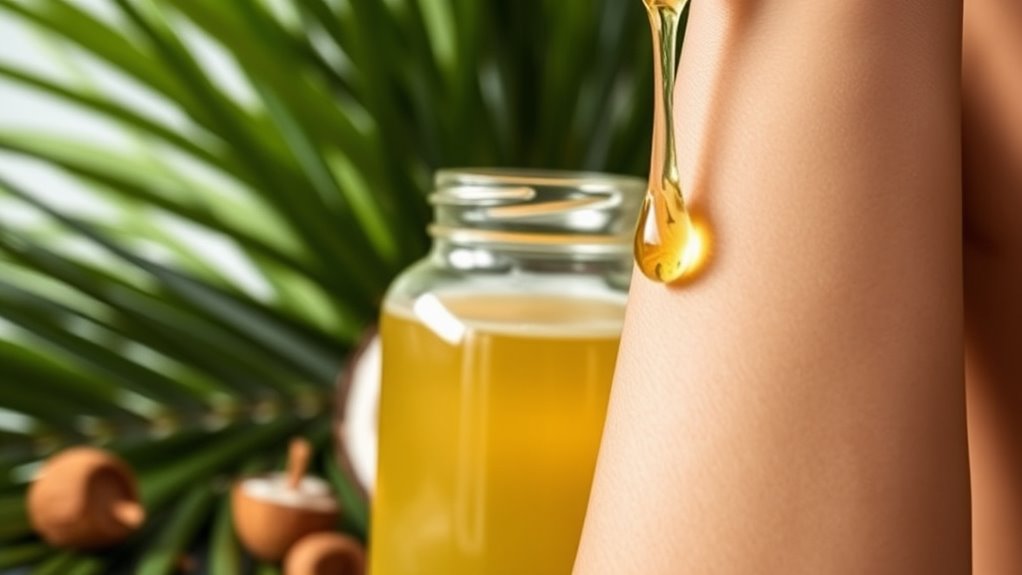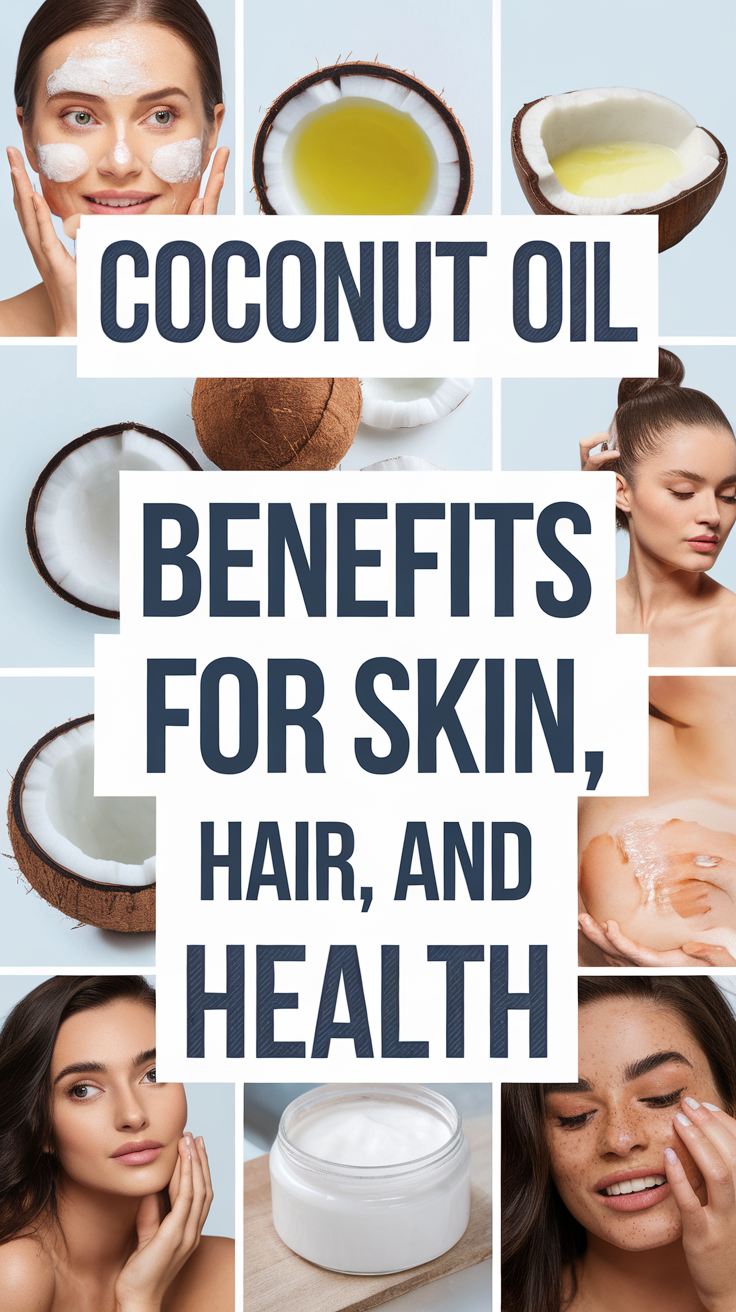Coconut Oil Hacks for Everyday Use
Coconut oil is your all-in-one hack for everyday life! Use it as a moisturizer for dry skin, a gentle makeup remover, or a natural lip balm. In the kitchen, swap butter for coconut oil in baking or cooking for added flavor. It’s also great for haircare—apply it as a deep conditioning treatment to boost shine and reduce frizz. For eco-friendly cleaning, mix it with baking soda to scrub surfaces or polish wooden furniture. You’ll discover even more versatile uses and tips that make coconut oil a must-have in your home.
Key Takeaways
- Use coconut oil as a natural moisturizer for dry skin, particularly on elbows and knees for effective hydration.
- Substitute coconut oil for butter or vegetable oil in cooking to enhance flavor and provide a healthier option.
- Apply warm coconut oil as a deep conditioner to improve hair moisture and shine while reducing frizz.
- Mix coconut oil with baking soda for a non-toxic cleaning scrub that effectively cleans surfaces and polishes furniture.
- Create your own DIY lip balm by combining coconut oil with natural ingredients for hydration and smoothness.
Beauty Benefits of Coconut Oil
Coconut oil isn’t just a kitchen staple; it’s a powerful ally in your beauty routine. Packed with nourishing properties, it’s an excellent moisturizer for your skin. You can easily apply it to dry areas like elbows and knees, giving your skin a healthy, radiant glow. Its anti-aging properties help reduce the appearance of fine lines and wrinkles, making it a fantastic addition to your skincare arsenal.
But that’s not all—coconut oil also doubles as a gentle makeup remover. Instead of using harsh chemicals, just rub a small amount onto your face. It effortlessly dissolves makeup, leaving your skin clean and moisturized. You’ll love how easy it’s to use, and you’ll appreciate that it doesn’t strip your skin of its natural oils.
You can even use it as a lip balm! Just dab a little on your lips for hydration and a subtle shine.
With its versatility and effectiveness, coconut oil can transform your beauty regimen. So next time you reach for that bottle in your kitchen, remember it’s not just for cooking; it’s a secret beauty weapon waiting to be revealed.
Culinary Uses for Coconut Oil
Many home cooks have discovered the delightful culinary uses of coconut oil, which adds a unique flavor and numerous health benefits to various dishes. You’ll find that it’s an excellent substitute for butter or vegetable oil in many recipes.
Whether you’re sautéing veggies, baking cookies, or frying eggs, coconut oil enhances the dish’s flavor while providing healthy fats.
When it comes to cooking techniques, coconut oil can withstand high temperatures, making it perfect for stir-frying or searing meats. Its natural sweetness also works wonders in baking, adding a subtle, tropical twist to your favorite desserts.
You can even use it to pop popcorn for a delicious snack that’s both fulfilling and nutritious.
As a flavor enhancer, coconut oil complements spices and herbs beautifully, elevating your dishes to new heights. Drizzling melted coconut oil over roasted vegetables can transform a simple meal into a gourmet experience.
You might also consider blending it into smoothies for a creamy texture and added richness. Overall, coconut oil is a versatile kitchen staple that will inspire you to experiment and enjoy healthier cooking!
Coconut Oil for Skincare
After discovering the culinary wonders of coconut oil, you might be surprised to learn how beneficial it’s for your skin. This versatile oil boasts impressive moisturizing properties that can enhance your skincare routine.
Here are four practical ways you can incorporate coconut oil into your daily regimen:
-
Moisturizer: Apply coconut oil directly to your skin after showering. It locks in moisture, leaving your skin soft and hydrated throughout the day.
-
Makeup Remover: Use coconut oil to effortlessly remove makeup. Just a small amount on a cotton pad breaks down even waterproof products without drying out your skin.
-
Acne Treatment: While it may seem counterintuitive, coconut oil’s antibacterial properties can help reduce acne. Dab a small amount on blemishes to promote healing and prevent new breakouts.
-
Lip Balm: Keep your lips smooth and hydrated by using coconut oil as a natural lip balm. It’s especially effective in dry or cold conditions.
Incorporating coconut oil into your skincare routine can lead to healthier, more radiant skin.
Give it a try and enjoy the benefits!
Haircare Hacks With Coconut Oil
Coconut oil is a game-changer for your hair, offering a simple solution for deep conditioning and frizz control.
By incorporating this natural oil into your routine, you can transform dry, unruly locks into smooth, healthy strands.
Let’s explore how you can use coconut oil to achieve your best hair yet!
Deep Conditioning Treatment
Regularly treating your hair to a deep conditioning session with coconut oil can work wonders for its health and appearance. This natural oil is packed with nutrients that enhance moisture retention, making your hair feel softer and look shinier.
Here’s how to use coconut oil effectively for deep conditioning:
-
Choose the Right Coconut Oil: Opt for organic, unrefined coconut oil for the best results. It retains more nutrients and is free from harmful additives.
-
Warm the Oil: Gently heat a few tablespoons of coconut oil until it’s warm but not hot. This helps it penetrate your hair better.
-
Apply Generously: Section your hair and apply the warm oil from roots to tips. Make sure to cover every strand for maximum moisture retention.
-
Let It Soak: Leave the coconut oil in your hair for at least 30 minutes. For deeper conditioning, wrap your hair in a warm towel and let it sit for a couple of hours or even overnight.
Rinse thoroughly with shampoo, and enjoy the benefits of hydrated, healthy hair!
Frizz Control Solution
Frizz can be a persistent challenge for many people, but coconut oil offers an effective solution to tame those unruly strands. This natural oil not only hydrates but also provides an excellent barrier against humidity, which is a major culprit behind frizz.
To use coconut oil for frizz prevention, start by warming a small amount in your palms. Apply it to damp hair, focusing on the mid-lengths and ends, where frizz is most common. This helps lock in moisture and adds shine, making styling easier.
If you prefer a styling technique that works throughout the day, consider using a few drops on dry hair. Just rub it between your hands and gently smooth it over your hair to eliminate any flyaways.
For those with curly or wavy hair, you can mix coconut oil with your favorite styling cream for added definition and frizz control. Experiment with different amounts to find the perfect balance for your hair type.
With these simple techniques, you’ll notice a significant reduction in frizz, allowing you to enjoy smooth, manageable locks every day.
Home Remedies Featuring Coconut Oil
When you’re looking for natural solutions to common ailments, coconut oil often proves to be a versatile ally. Its health benefits are numerous, making it a staple in many home remedy kits.
Here are four effective ways you can use coconut oil to tackle everyday issues:
-
Moisturizer: Apply coconut oil to dry skin to lock in moisture. It’s especially helpful for elbows and knees.
-
Sore Throat Relief: Mix coconut oil with honey and lemon for a soothing drink that can ease a scratchy throat.
-
Bug Bite Treatment: Dab coconut oil on insect bites to reduce itching and inflammation. Its anti-inflammatory properties help calm irritation.
-
Dandruff Control: Massage coconut oil into your scalp to combat dandruff. It hydrates the skin and helps slough off dead skin cells.
Incorporating coconut oil into your home remedies not only simplifies your routine but also enhances your well-being.
With its natural properties, you can address various ailments while enjoying the delightful scent and smooth texture of this incredible oil.
Eco-Friendly Uses of Coconut Oil
Embracing eco-friendly practices can be as simple as incorporating coconut oil into your daily routine. This versatile oil isn’t just a cooking ingredient; it’s also a powerful asset for sustainable living.
Start by using coconut oil for natural cleaning. Mix it with baking soda to create a gentle scrub for your kitchen surfaces, or use it to polish wooden furniture, leaving it shiny and protected.
When it comes to personal care, opt for coconut oil instead of products in plastic containers. You can make your own moisturizers or lip balms, reducing your reliance on items with non-biodegradable packaging. By choosing coconut oil, you’re supporting sustainable packaging practices and cutting down on waste.
You can also use coconut oil to condition your hair, promoting healthy locks without harmful chemicals. It’s a great way to embrace a more natural beauty routine.
Lastly, consider using coconut oil to make DIY candles—perfect for reducing waste from store-bought options.
With these eco-friendly uses, you can easily make a positive impact while enjoying the many benefits of coconut oil in your everyday life.
Frequently Asked Questions
Can Coconut Oil Cause Allergic Reactions in Some Individuals?
Yes, coconut oil can cause allergic reactions in some individuals. If you experience allergy symptoms like itching or swelling after using it, you might have coconut oil sensitivities. Always patch test new products to guarantee safety.
How Should Coconut Oil Be Stored for Maximum Shelf Life?
Think of coconut oil like a fine wine; proper coconut oil storage maximizes its shelf life. Keep it in a cool, dark place, tightly sealed, away from light and heat to maintain its quality longer.
Is There a Difference Between Refined and Unrefined Coconut Oil?
Yes, there’s a difference. Refined coconut oil offers a higher smoke point and neutral flavor, making it great for cooking. Unrefined coconut oil retains more nutrients, making it ideal for skin care and culinary uses.
Can Coconut Oil Be Used for Oil Pulling?
You can certainly indulge in oil pulling with coconut oil. This practice promotes oral health and offers various benefits, like reducing bacteria and freshening breath. Just swish a tablespoon for about 15-20 minutes daily.
What Are the Environmental Impacts of Coconut Oil Production?
Coconut oil production can lead to significant environmental impacts, including deforestation effects that harm biodiversity. By supporting sustainable farming practices, you can help mitigate these issues and promote healthier ecosystems for future generations.

